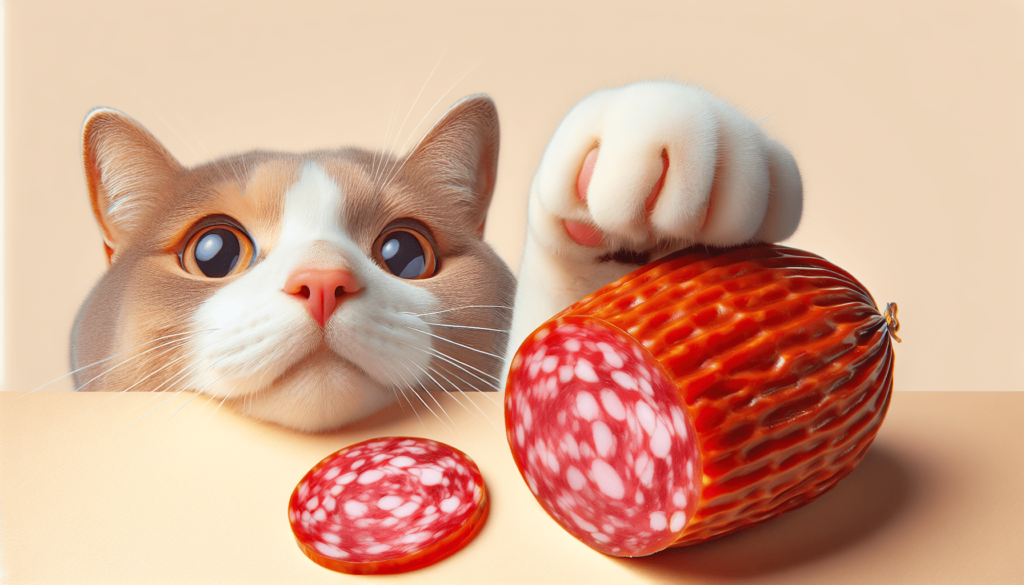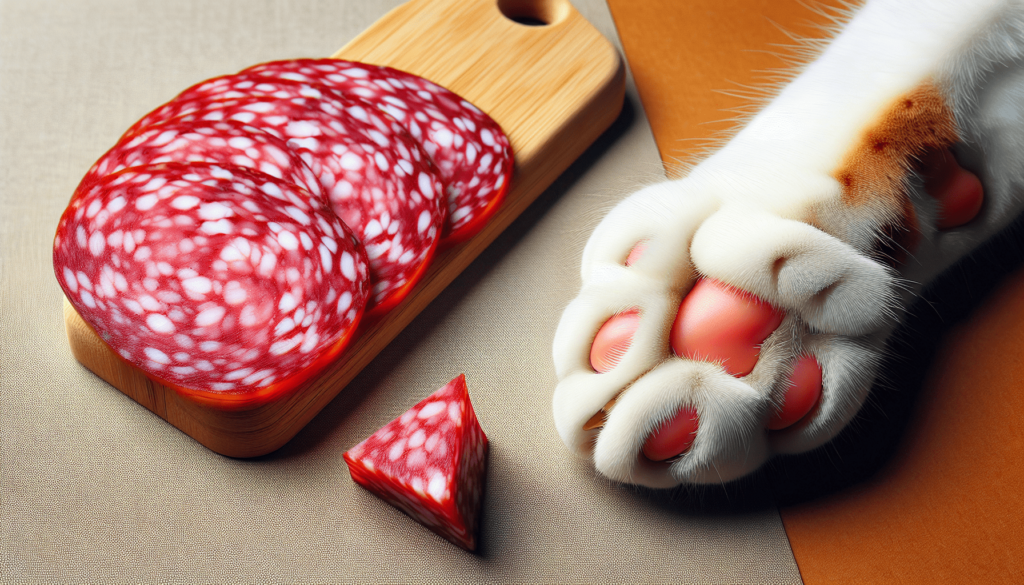Hey there! Interested in treating your feline friend to some salami but not sure if it’s safe for them to eat? Well, you’ve come to the right place. In this article, we’ll explore whether cats can safely enjoy salami as an occasional treat or if it’s best to stick to more traditional cat-friendly snacks. So, grab a seat and let’s dive into the world of feline-friendly foods together! Can Cats Have Salami?
Have you ever wondered if your feline friend can enjoy a tasty slice of salami with you? Many cat owners are unsure about what human foods are safe for their pets to consume. In this article, we will explore whether cats can have salami as part of their diet.
Understanding Your Cat’s Diet
Before we delve into the specifics of whether cats can have salami, it is essential to understand the dietary needs of your feline companion. Cats are obligate carnivores, which means that they require a diet rich in animal-based proteins to thrive. Their bodies are adapted to digest and metabolize animal proteins efficiently.
The Importance of Protein in a Cat’s Diet
Protein is a crucial component of a cat’s diet as it provides essential amino acids that are necessary for various bodily functions. Cats require a higher protein intake compared to other animals, as they have a higher metabolic rate. Protein supports muscle growth and repair, immune function, and overall health in cats.
When considering adding any human food to your cat’s diet, it is important to ensure that it does not interfere with their essential dietary requirements, particularly their need for high-quality proteins.

Can Cats Eat Salami?
Now that we have established the importance of protein in a cat’s diet, let’s address the question at hand – can cats have salami? Salami is a type of cured sausage that is typically made from a mix of pork and beef, seasoned with various spices and herbs. While salami may be a delicious treat for us humans, it may not be the best choice for our feline friends.
The Risks of Feeding Salami to Cats
Salami contains high levels of salt, fat, and spices, which can be harmful to cats. Excessive salt consumption can lead to sodium ion poisoning, which can cause symptoms such as vomiting, diarrhea, tremors, and even organ damage in cats. High-fat foods like salami can also lead to obesity and digestive issues in cats.
The spices and herbs used in salami can be irritating to a cat’s digestive system, leading to gastrointestinal upset and discomfort. Additionally, some salami products may contain ingredients like onion and garlic, which are toxic to cats and can cause serious health issues if ingested.
Moderation is Key
If you are considering giving your cat a small piece of salami as an occasional treat, it is crucial to do so in moderation. Remember that treats should not make up a significant portion of your cat’s diet, and it is essential to prioritize their nutritional needs over indulging their taste buds.

Safe Alternatives to Salami
While salami may not be the best option for your cat, there are plenty of safe and healthy alternatives that you can offer as treats. Here are some options that your cat is sure to love:
Cooked Meat
Lean cooked meats such as chicken, turkey, or beef can be a great source of protein for your cat. Make sure to remove any bones, skin, and seasoning before offering it to your pet. Cooked meat provides essential nutrients while minimizing the risks associated with processed meats like salami.
Fish
Many cats enjoy the taste of fish, which is another excellent source of protein for your feline friend. Opt for cooked fish like salmon or tuna, and avoid feeding raw fish to prevent the risk of foodborne illnesses. Fish can provide omega-3 fatty acids that support your cat’s skin, coat, and overall health.
Cat-Safe Fruits and Vegetables
Some fruits and vegetables can be safe for cats to consume in moderation. Offer small pieces of cat-friendly fruits like watermelon, cantaloupe, or banana as a sweet treat. Vegetables such as cooked carrots or green beans can also be added to your cat’s diet for added nutrients and fiber.

Monitoring Your Cat’s Health
While it is essential to provide your cat with a balanced diet that meets their nutritional requirements, it is equally important to monitor their health and well-being. Keep an eye on your cat’s weight, energy levels, coat condition, and overall behavior to ensure that they are healthy and thriving.
Regular Veterinary Check-Ups
Schedule regular veterinary check-ups for your cat to monitor their health and catch any potential issues early on. Your veterinarian can provide guidance on your cat’s diet, weight management, and overall care to ensure that they live a long and healthy life.

In Conclusion
In conclusion, while cats may enjoy the taste of salami, it is not the best choice for their health. Salami is high in salt, fat, and spices, which can be harmful to cats and may not align with their nutritional needs as obligate carnivores. It is best to offer your cat safe and healthy alternatives as treats, such as cooked meat, fish, and cat-safe fruits and vegetables.
Remember that your cat’s health and well-being should always be the top priority when considering what foods to offer them. By providing a balanced and nutritious diet, monitoring their health, and consulting with your veterinarian, you can ensure that your feline friend lives a happy and healthy life.


